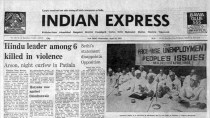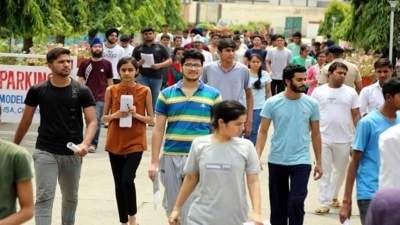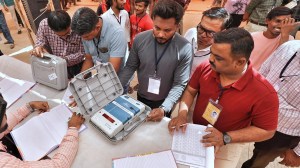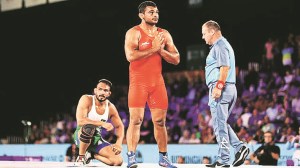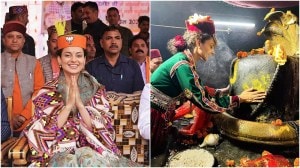- India
- International
To disparage India’s parliamentary democracy, some are imagining its decline
Rajyavardhan Singh Rathore writes: When it comes to Parliament’s health, post-Narendra Modi, its productivity and standing as a forum for debate have actually been raised.
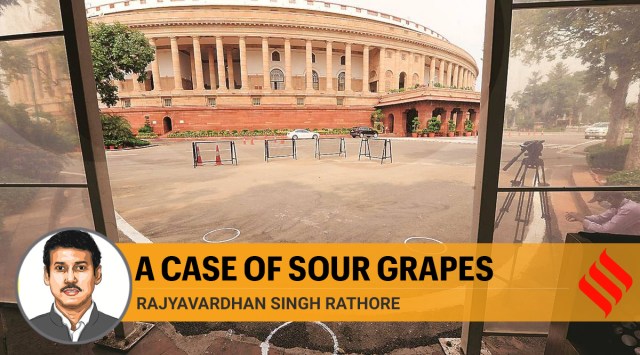 The 16th Lok Sabha spent 32 per cent of its time on legislative business, which is second only to the first Lok Sabha.
The 16th Lok Sabha spent 32 per cent of its time on legislative business, which is second only to the first Lok Sabha. Over the past few years, it has become a fad within a cocooned elite ecosystem to predict or claim that India and its institutions are declining. People within this ecosystem have become so obsessed with wanting to see India decline that, now, they see it happening irrespective of the facts on the ground. If facts don’t suit their perceptions, they can always manufacture narratives to suit their pre-conceived notions and torture isolated bits of information to say what they want.
If election results are not to their liking, then the whole election process is questioned. If court judgments are not to their liking, then they cast aspersions on the judiciary. Similarly, to disparage India’s parliamentary democracy, this ecosystem has suddenly begun to see an imaginary decline.
Ironically enough, there was an attempt made to gauge the health of an institution by actually focusing on an individual. On even days, they analyse the health of Parliament by how many times one individual — Narendra Modi — spoke in it, like a column recently sought to do. On odd days, these people disparage the genuine affection of the Indian people towards Prime Minister Modi as the supposed elevation of an individual above institutions.
PM Modi leads a talented team. He leads from the front but emphasises teamwork. He is the prime minister in a government that has able ministers in Parliament, who, along with the PM, answer all questions — even wild and unfounded allegations — with dignity. If Modi had spoken more than his predecessors or his team in Parliament, the same ecosystem would have said that democracy is in danger because Modi monopolises Parliament’s time!

There is a tendentious attempt to say Parliament has ceased to be a place of debate in the last six years. But the facts say something else. When it comes to Parliament’s health, post-Narendra Modi, its productivity and standing as a forum for debate have actually been raised.
Consider legislation, which is the core responsibility of elected representatives. The 16th Lok Sabha spent 32 per cent of its time on legislative business, which is second only to the first Lok Sabha. This is higher than the average of all other Lok Sabhas, which spent about 25 per cent of their time on legislative business. After Modi bowed at the steps of Parliament, the subsequent Lok Sabha spent more time in legislative business than most other Lok Sabhas.
Recently, there was a manufactured controversy around Question Hour. Those who said Question Hour is the cornerstone of Parliamentary democracy had conveniently cancelled Question Hour in their state assemblies.In the 16th Lok Sabha, Question Hour worked for 67 per cent of its scheduled time. The loss of time was due to disruptions. The nation watched live and understood who disrupted Parliament regularly, harming democracy. Discussion and debate are the most important duties of Parliament, especially around legislation. It turns out that Bills were discussed for more time in the 16th Lok Sabha than the 14th and 15th Lok Sabhas. Thirty-two per cent of Bills were discussed for more than three hours and around 27 per cent were discussed for between two and three hours, significantly higher than both terms of the UPA.
In the 15th Lok Sabha (2009-2014), about 26 per cent of Bills were passed with less than 30 minutes of debate, while in the 16th Lok Sabha only 6 per cent of Bills were passed with less than 30 minutes of debate. Further, the percentage of the budget that was discussed in the 16th Lok Sabha was higher than the two Lok Sabhas before it. Clearly, better debate and discussion happened in the Lok Sabha in Narendra Modi’s first term as Prime Minister than during both terms of Manmohan Singh’s government. Even in the 17th Lok Sabha, the statistics before the coronavirus pandemic struck are impressive. The first session of the 17th Lok Sabha worked for 135 per cent of the scheduled hours and Rajya Sabha for 100 per cent. This performance is better than any other session in two decades. In the subsequent winter session of 2019, Lok Sabha worked for 111 per cent of the scheduled time and Rajya Sabha for 92 per cent. The correct picture that comes out of all these facts — easily available in the public domain (on the website of PRS Legislative Research) — is that parliamentary democracy in India is in excellent health.
However, the problem for a small set of people is not the healthy functioning of Parliament but the fact that its composition is not to their liking. Unable to digest Modi’s popularity, this ecosystem had even tried to spread the fear that there won’t be any democracy if he is voted in. The opposite has happened. Modi has been voted in twice and democracy has thrived. India has proven many such naysayers wrong over the decades and it will continue to do so.
This article first appeared in the print edition on October 16, 2020 under the title ‘A case of sour grapes’. The writer is a BJP MP.
40 Years Ago
EXPRESS OPINION
More Explained
Apr 18: Latest News
- 01
- 02
- 03
- 04
- 05











